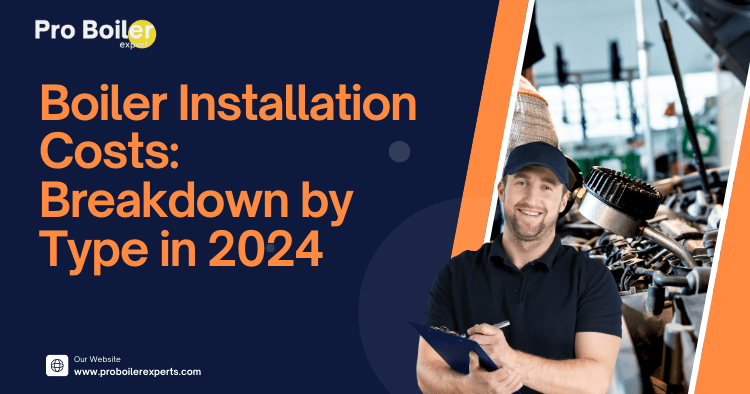Table of Contents
- Introduction
- Understanding Boiler Types
- Cost Breakdown by Boiler Type
- Installation Costs: What to Expect
- Additional Costs to Consider
- FAQs
- Conclusion
Introduction
Boiler installation can be a significant investment for homeowners, especially with various types of boilers available in 2024. Understanding the costs associated with each type can help you make an informed decision that fits your budget and heating needs. In this article, we’ll break down the installation costs for different boiler types, making it easier for you to choose the right one.
Choosing the right boiler is not just about the initial cost; consider the long-term savings and efficiency as well.
Understanding Boiler Types
Before diving into the costs, it’s essential to understand the different types of boilers available today. Each type has unique features, benefits, and installation requirements that affect overall costs.
Combi Boilers
Combi (combination) boilers are highly efficient units that provide both heating and hot water on demand without the need for a separate water tank. They are popular in smaller homes where space is limited. For more information on the benefits of combi boilers, check here.
Combi boilers can save you space and energy, making them an ideal choice for modern living.
System Boilers
System boilers store hot water in a cylinder but don’t require a tank. They are ideal for homes with multiple bathrooms or larger families, as they can supply hot water to several outlets simultaneously. Learn more about the advantages of system boilers here.
Regular Boilers
Regular boilers, also known as traditional or conventional boilers, consist of a hot water cylinder and a cold water tank. They are best suited for larger homes with high hot water demands. For insights into the benefits of regular boilers, see this link.
Regular boilers may seem old-fashioned, but they are still a reliable choice for certain home layouts.
Condensing Boilers
Condensing boilers are designed to be more energy-efficient by capturing and reusing heat from exhaust gases. They can be either combi, system, or regular boilers and are often recommended for their reduced energy costs. For a deeper understanding of condensing boilers, check here.
Cost Breakdown by Boiler Type
To provide clarity on installation costs, here’s a detailed breakdown of each boiler type for 2024.
Combi Boiler Costs
| Item | Estimated Cost ($) |
|---|---|
| Boiler unit | 2,500 – 3,500 |
| Installation | 1,000 – 1,500 |
| Total | 3,500 – 5,000 |
Combi boilers are generally less expensive to install due to their compact size and straightforward installation process. They are favored for their efficiency and ability to provide instant hot water.
Despite initial savings, always consider total ownership costs, including maintenance and energy efficiency.
System Boiler Costs
| Item | Estimated Cost ($) |
|---|---|
| Boiler unit | 2,000 – 4,000 |
| Cylinder | 500 – 1,200 |
| Installation | 1,200 – 1,800 |
| Total | 3,700 – 7,000 |
System boilers incur additional costs due to the need for a hot water cylinder. However, they are a great choice for homes with higher hot water demands.
Regular Boiler Costs
| Item | Estimated Cost ($) |
|---|---|
| Boiler unit | 1,500 – 3,000 |
| Cylinder | 500 – 1,200 |
| Cold water tank | 200 – 500 |
| Installation | 1,500 – 2,500 |
| Total | 3,900 – 7,200 |
Regular boilers typically have the highest installation costs due to the complexity of the system and the additional components required.
When considering regular boilers, factor in the space needed for both the cold water tank and the hot water cylinder.
Condensing Boiler Costs
| Item | Estimated Cost ($) |
|---|---|
| Boiler unit | 2,000 – 4,500 |
| Installation | 1,000 – 1,500 |
| Total | 3,000 – 6,000 |
Condensing boilers can be slightly more expensive upfront but offer long-term savings through lower energy bills due to their high efficiency.
Installation Costs: What to Expect
In addition to the boiler unit itself, installation costs can vary significantly based on several factors, including:
- Location: Urban areas may have higher labor costs compared to rural areas.
- Complexity of Installation: If your home requires extensive plumbing or electrical work, expect to pay more.
- Existing Infrastructure: Homes with older systems may need updates, increasing costs.
Always budget a little extra for unforeseen issues during the installation process.
It’s advisable to get at least three quotes from reputable installers to ensure you’re getting a fair price. For tips on choosing the right boiler installer, refer to this article.
Additional Costs to Consider
When budgeting for a new boiler, don’t forget to consider these additional costs:
- Maintenance: Regular servicing can cost between $150 to $300 annually.
- Repairs: Unexpected repairs can arise, so having a contingency fund is wise.
- Energy Efficiency Upgrades: Consider investing in smart thermostats or insulation to improve overall efficiency. For more energy efficiency tips, check here.
Investing in energy efficiency now can lead to significant savings in the future.
FAQs
What is the most cost-effective boiler type?
Combi boilers are often considered the most cost-effective due to their lower installation costs and efficiency.
How long does a boiler installation take?
Most installations can be completed in a day, but it may take longer if additional work is required.
Are there any government incentives for boiler installation in 2024?
Check your local government’s energy efficiency programs, as many offer incentives for upgrading to high-efficiency boilers. You can visit Energy.gov for more information.
Always check for local incentives; they can significantly reduce your overall costs.
Conclusion
Choosing the right boiler type for your home in 2024 involves understanding the costs associated with each option. Combi, system, regular, and condensing boilers each have their unique benefits and price points. By considering your heating needs and budget, you can make an informed decision that keeps your home warm and your wallet happy. Remember, investing in a quality boiler can lead to lower utility bills and a more comfortable living environment for years to come! For more insights on boiler types, consider exploring high-efficiency boilers and how they can enhance your home heating experience.




